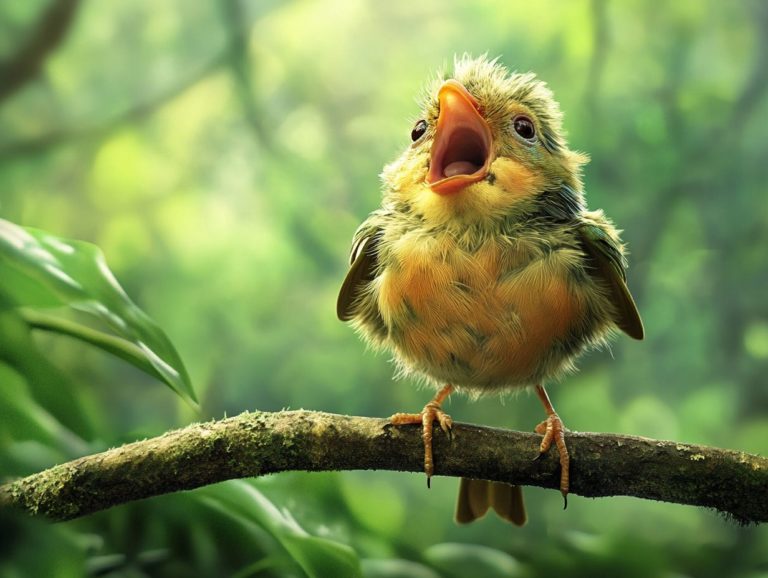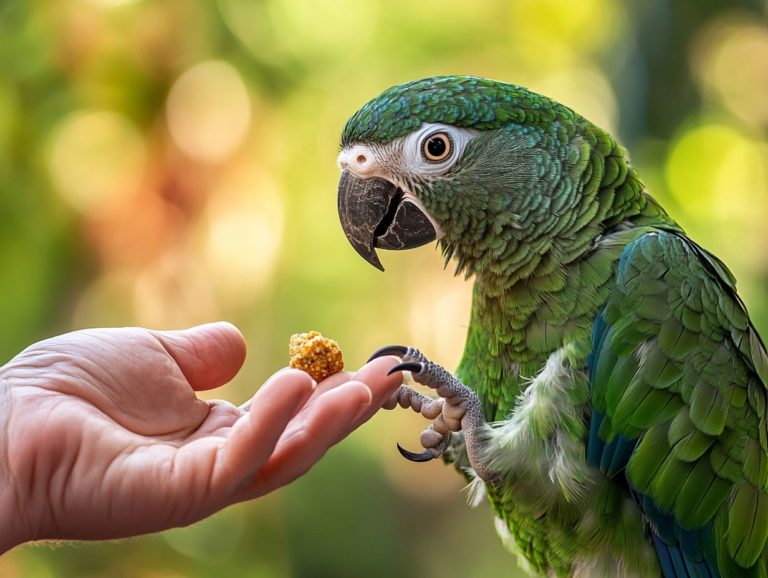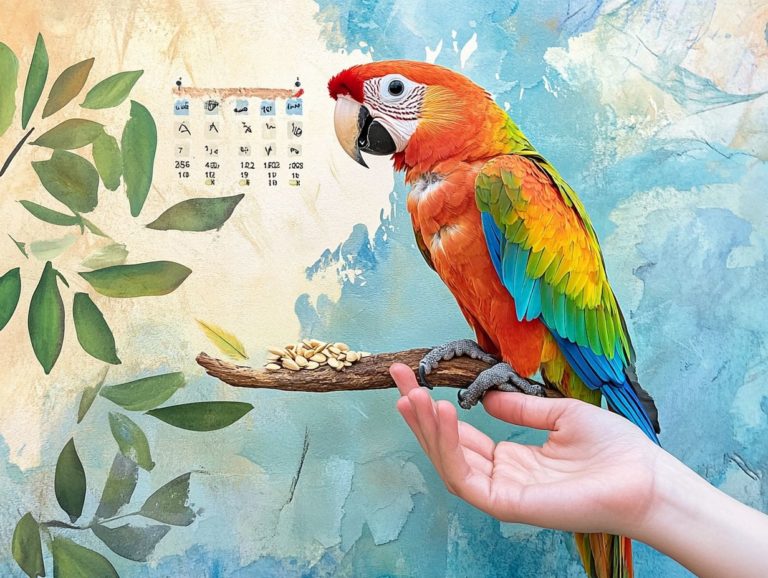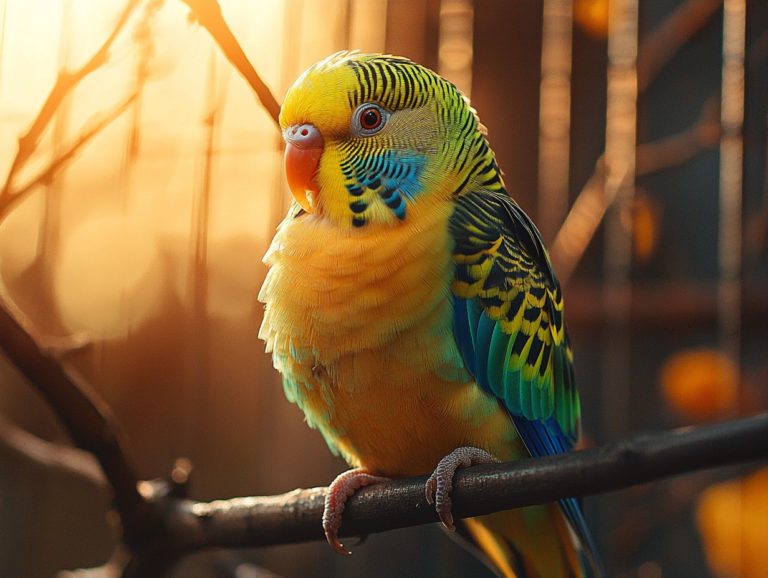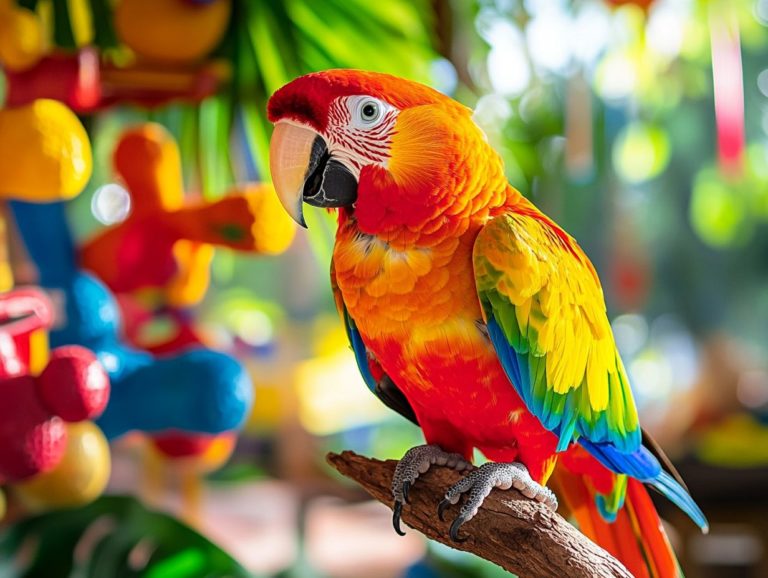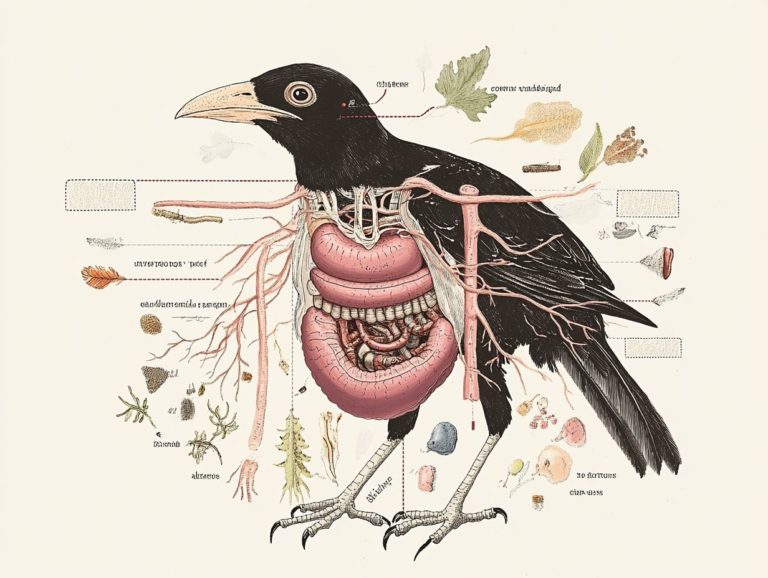5 Natural Remedies for Common Bird Ailments
Birds make delightful companions, yet, like all pets, they can encounter health challenges, especially related to various health problems.
Fortunately, nature provides a wealth of remedies, including herbal infusions and plant-based remedies, to help keep your feathered friends vibrant and healthy.
This article delves into five natural remedies for your birds:
- Apple Cider Vinegar for respiratory infections
- Garlic for combating parasites
- Chamomile for easing stress and anxiety
- Turmeric for reducing inflammation
- Echinacea for boosting immunity
You ll learn about common bird ailments, preventive measures, and the importance of a balanced diet in ensuring their well-being.
Join us to discover simple methods that can boost your bird’s health!
Contents
- Key Takeaways:
- 1. Apple Cider Vinegar for Respiratory Infections
- 2. Garlic for Parasites
- 3. Chamomile for Stress and Anxiety
- 4. Turmeric for Inflammation
- 5. Echinacea for Boosting Immunity
- What Are Some Common Ailments in Birds?
- How Can Apple Cider Vinegar Help with Respiratory Infections?
- Why Is Garlic Effective in Treating Parasites in Birds?
- How Does Chamomile Help with Stress and Anxiety in Birds?
- What Are the Benefits of Using Turmeric for Inflammation in Birds?
- How Can Echinacea Help Boost the Immune System of Birds?
- What Are Some Other Natural Remedies for Common Bird Ailments?
- When Should a Bird Owner Consult a Veterinarian for Their Bird’s Ailments?
- How Can Bird Owners Prevent Common Ailments in Their Birds?
- What Are Some Precautions to Take When Using Natural Remedies for Birds?
- How Can a Balanced Diet Help Maintain a Bird’s Health?
- Frequently Asked Questions
- Discover 5 Amazing Natural Remedies for Common Bird Ailments!
- Can These Natural Remedies Be Used for Any Type of Bird?
- How Often Should These Natural Remedies Be Used?
- Are There Any Natural Remedies That Can Help with Feather Plucking?
- Can These Natural Remedies, Such as Herbal Options, Replace Traditional Medication?
- Are there any potential side effects of using these natural remedies, including herbal supplements?
Key Takeaways:

- Apple cider vinegar can be used to treat respiratory infections in birds due to its antibacterial and antifungal properties.
- Garlic has natural anti-parasitic properties that can help eliminate parasites in birds.
- Chamomile can help soothe stress and anxiety in birds, making it a useful natural remedy for calming them down.
1. Apple Cider Vinegar for Respiratory Infections
Apple Cider Vinegar has long been celebrated for its impressive health benefits, especially in the realm of caring for birds. It acts as a natural remedy for respiratory infections across various bird species. This easy-to-find solution has beneficial compounds that offer anti-inflammatory effects, making it an excellent alternative treatment for avian ailments.
With its potent active compounds, Apple Cider Vinegar supports overall health and helps mitigate health risks associated with respiratory issues in birds. When used correctly, it emerges as a safe practice in pet bird care, providing a gentle yet effective solution.
The appropriate dosage typically ranges from a few drops to a teaspoon per liter of water, depending on the size and species of your bird. Always consult a veterinarian before use, particularly if your bird is already on other herbal preparations, as interactions may arise.
The anti-inflammatory benefits of Apple Cider Vinegar can ease symptoms of respiratory discomfort, promoting easier breathing and overall wellness. This natural option serves as a supplementary treatment but should never replace conventional veterinary care.
By carefully monitoring your bird and making adjustments based on professional guidance, you can ensure a balanced approach to bird health, maximizing the advantages of this remarkable herbal remedy.
2. Garlic for Parasites
Garlic is widely acclaimed for its potent properties as a natural remedy for parasites, making it an essential tool for any discerning bird owner seeking effective treatment solutions.
Various parasites, such as mites, worms, and flukes, can severely impact the health and well-being of your feathered companions. These unwelcome intruders can trigger serious conditions if not addressed promptly, leading to discomfort and potentially life-threatening issues.
Incorporating garlic into your birds’ diets can be a game-changer. Known for its antifungal, antiviral, and antibacterial properties, garlic can effectively combat these parasitic threats. You can introduce garlic by mixing crushed cloves into their food or diluting it in their water for easy consumption.
However, exercise caution; excessive garlic intake can pose health risks, including gastrointestinal distress or anemia. Act quickly to address any signs of parasite infestation to protect your bird’s health. Consulting a veterinary surgeon before embarking on any treatment, especially in cases of severe infestations, is essential to ensure the safety and well-being of your avian friends.
Have you tried any of these remedies? Share your experiences in the comments!
3. Chamomile for Stress and Anxiety
Chamomile serves as a soothing herbal remedy that you can use to help your birds feel calmer and happier. This creates a serene environment conducive to optimal bird care and health.
This gentle herb is versatile. It is available in various forms such as an herbal infusion or a concentrated extract. When you prepare it as tea, offer the infusion in small, bird-safe doses to encourage relaxation. Extracts may provide a more potent option for those seeking immediate effects. The calming properties of chamomile are well-documented. They are known to ease nervous behaviors and instill a sense of tranquility. This makes chamomile an effective alternative to regular medications.
As more bird enthusiasts like you turn to herbal solutions, integrating chamomile into your routine can help foster a peaceful atmosphere that benefits both the birds and you as their caretaker.
4. Turmeric for Inflammation
Turmeric is an esteemed herbal remedy celebrated for its powerful anti-inflammatory properties. It provides natural solutions for a range of health issues that your birds may face.
The key to its effectiveness lies in a compound known as curcumin (curcumin is a natural compound found in turmeric that helps reduce inflammation). Curcumin not only blocks pro-inflammatory molecules but also bolsters the body s antioxidant defense system. For optimal results, a dosage of around 20 mg per kilogram of body weight is often recommended. This may vary depending on your bird s specific health condition.
Using herbal preparations, such as turmeric-infused oils or formulations combined with black pepper, can further amplify its benefits. Black pepper enhances curcumin absorption. It s crucial to consult with a veterinarian before introducing any treatment, especially for ongoing health concerns. This ensures the safety and well-being of your feathered friends.
5. Echinacea for Boosting Immunity
Echinacea is celebrated for its remarkable ability to enhance immunity. It establishes itself as a potent herbal remedy for supporting the health of various bird species and shielding them from common infections.
You can easily incorporate Echinacea into your bird’s diet through specially formulated bird foods, teas, or tinctures. This allows you to tailor the dosage based on the size and species of your feathered companions. This natural supplement not only strengthens the immune system but also promotes respiratory health.
Stay alert for potential side effects, such as digestive upset or allergic reactions, especially if introduced too suddenly. Adhering to proper dosage guidelines is essential for safe and effective use. This ensures your avian friends enjoy the benefits without any adverse effects.
What Are Some Common Ailments in Birds?

Birds can easily fall victim to a host of common ailments, such as respiratory infections and digestive issues. These can create significant health challenges and necessitate timely veterinary advice for effective treatment.
These conditions often emerge from various factors, including improper diet, environmental stressors, and inadequate hygiene practices. For instance, respiratory infections may be triggered by drafts or poor air quality. Digestive troubles can result from low-quality feed or abrupt d dietary changes.
If you notice symptoms like lethargy, changes in eating habits, or unusual droppings, these often indicate underlying health concerns. Therefore, it’s crucial to seek prompt veterinary care for accurate diagnosis and treatment.
Explore natural remedies like herbal supplements or dietary adjustments. Incorporating superfoods for a healthier bird can aid in restoring your bird’s health in a holistic manner.
How Can Apple Cider Vinegar Help with Respiratory Infections?
Apple Cider Vinegar can be a game-changer for respiratory infections in birds. It contains ingredients that support their respiratory health and overall well-being.
This natural remedy helps clear mucus and reduces swelling in the air passages. As a result, your feathered friends can breathe more easily.
To use apple cider vinegar, dilute it with water to prevent throat irritation. A common ratio is one part vinegar to ten parts water.
If your bird experiences severe symptoms like chronic coughing or lethargy, seek veterinary advice immediately. This ensures they get the proper care they need.
Why Is Garlic Effective in Treating Parasites in Birds?
Garlic is effective for combating parasites in birds. It offers a natural alternative to commercial products.
The key ingredient in garlic, allicin, is known for its ability to fight off parasites. It disrupts their life cycles, promoting better health for your birds.
You can give garlic in powdered form mixed with food or as an oil. Make sure the dosage is appropriate for your bird’s size.
Be cautious; too much garlic can upset their stomachs. Always consult with a veterinarian before adding garlic to your bird s diet.
How Does Chamomile Help with Stress and Anxiety in Birds?
Chamomile is a wonderful herb for relieving stress and anxiety in birds. It can significantly improve their overall well-being.
You can add chamomile to their diet as brewed tea or sprinkle dried herb over their meals. It’s simple to incorporate into your pet’s routine.
The calming properties of chamomile create a peaceful environment for your birds. This is especially helpful during stressful times, like loud noises or travel.
Watch for any side effects like lethargy or changes in appetite. These could indicate a negative reaction to herbal remedies.
What Are the Benefits of Using Turmeric for Inflammation in Birds?
Using turmeric can lead to significant health improvements for birds. It effectively addresses inflammation-related health issues.
This bright spice has powerful properties that reduce discomfort and improve overall health. It s a great addition to many herbal treatments.
Incorporating turmeric is easy; mix it into their food or offer it as a treat. Your birds will likely enjoy this delightful addition.
Always consult your veterinarian for tailored advice, especially for serious health concerns. This ensures your bird’s health needs are met.
How Can Echinacea Help Boost the Immune System of Birds?
Echinacea is an impressive natural remedy that can significantly enhance the immune system of your birds, helping them fend off respiratory infections and maintain peak health.
The magic lies in its ability to stimulate white blood cells, bolstering your birds natural defenses against pesky pathogens, thus promoting their health support. This herbal ally promotes the production of cytokines, small proteins that help control the immune response, providing a solid foundation for their overall wellbeing.
If you re considering adding Echinacea to their regimen, be sure to stick to the recommended dosages too much can lead to unwanted side effects and interfere with alternative treatments. It’s wise to exercise caution when combining Echinacea with other herbal supplements, as interactions could either amplify or diminish effects, especially with substances like goldenseal, a plant often used in herbal medicine, that influence liver enzyme activity.
Always consult a veterinarian before introducing any new supplement into your bird s diet, especially those involving medicinal plants. It s a smart move to ensure their health remains a top priority.
What Are Some Other Natural Remedies for Common Bird Ailments?
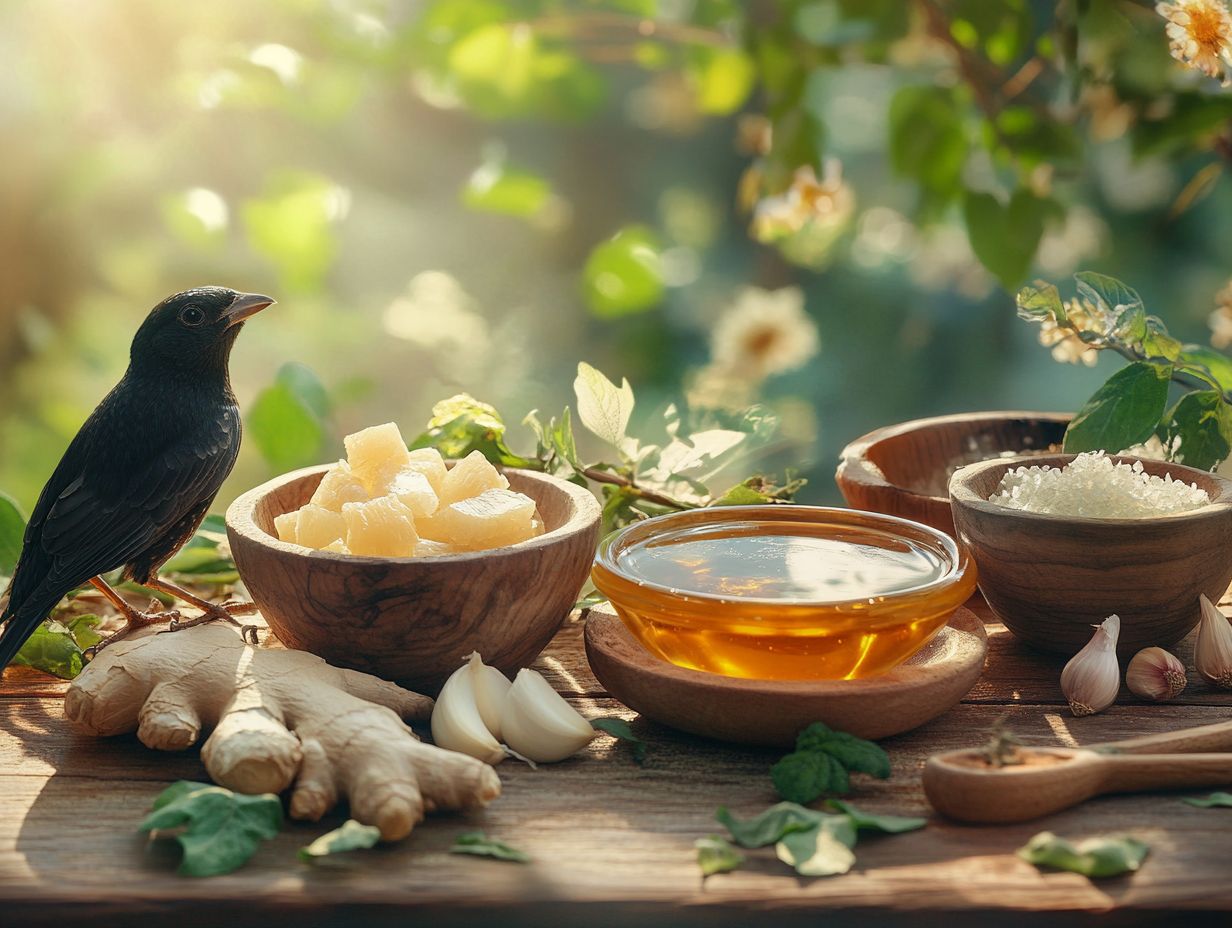
In addition to Apple Cider Vinegar, Chamomile, and garlic, you’ll find a wealth of natural remedies available for addressing common bird ailments, including herbal remedies for bird health, all aimed at supporting their well-being through holistic care.
Take turmeric, for example; it s celebrated for its anti-inflammatory properties and is often included in herbal preparations. You can offer small doses of about 1/4 teaspoon mixed into their food. Chamomile is another excellent choice, known for soothing digestive issues; simply brew a tea and offer it in small amounts once it s cooled.
However, it s wise to tread carefully. Overusing herbs can create imbalances or lead to adverse reactions in some birds, highlighting the importance of understanding dosage guidelines. Before embarking on any natural treatment, consulting with a veterinary surgeon is essential to ensure that the care you provide is safe and tailored to meet your bird s specific needs.
When Should a Bird Owner Consult a Veterinarian for Their Bird’s Ailments?
You should always consult a veterinarian when your bird shows signs of distress or exhibits symptoms of common ailments, ensuring that it receives prompt and effective healthcare.
If your bird appears lethargic, loses its appetite, or has abnormal droppings, these could be red flags pointing to underlying health issues. Other critical signs to watch for include difficulty breathing, feather plucking, or noticeable changes in behavior, such as withdrawal from social interaction.
Recognizing these symptoms early is essential; don’t wait delaying veterinary care could put your bird’s life at risk! By keeping a close eye on your bird s habits and overall demeanor, you can significantly impact its well-being, underscoring the importance of preventive care and regular check-ups.
How Can Bird Owners Prevent Common Ailments in Their Birds?
You can keep your birds healthy by taking a proactive approach to their care, focusing on health support through balanced diets and herbal interventions.
To ensure your feathered companions thrive, it’s essential to incorporate a variety of fresh fruits, vegetables, and high-quality pellets into their diets for maximum nutritional value. These nutritious options provide the vital vitamins and minerals they need.
Minimizing stress by creating a calm environment enhances their well-being, so consider maintaining comfortable temperatures and providing safe, spacious living conditions.
Regular veterinary check-ups are key for early detection of potential health issues, enabling timely interventions to avoid serious health risks. Offering social interaction opportunities is crucial for their mental health, ensuring they remain vibrant and lively while reducing the chances of health issues.
What Are Some Precautions to Take When Using Natural Remedies for Birds?
While natural remedies can offer benefits for birds, it’s crucial to approach them with caution to avoid potential health risks and ensure safe practices when selecting herbal preparations.
This involves understanding the appropriate dosages and being aware of toxic plants that could pose a threat to these delicate creatures. A thorough knowledge of herbal options is necessary.
Recognizing signs of toxicity is essential, as some birds may exhibit different reactions than others. This makes vigilance vital for their well-being.
Remember, not all natural remedies are suitable for every species. Consulting with a veterinarian a trained animal doctor before trying anything new is a wise move. They can provide veterinary advice tailored to your specific bird species, taking into account health history and current condition.
How Can a Balanced Diet Help Maintain a Bird’s Health?
A balanced diet is essential for maintaining your bird’s health. It provides the vital nutrients needed to support overall well-being and bolster resilience against diseases.
This diet includes a diverse mix of components seeds, fruits, vegetables, and proteins that work in harmony to meet the unique dietary needs of these avian companions. By integrating herbal supplements, you can significantly enhance their nutrition, providing added benefits like improved digestion and immune support.
Focusing on variety in their diet helps prevent nutritional deficiencies and transforms feeding time into an engaging experience that promotes better animal health.
Practicing proper feeding habits, such as avoiding an over-reliance on just one food type and ensuring everything is fresh, plays a crucial role in contributing to your bird’s longevity and enhancing their quality of life.
Frequently Asked Questions
Discover 5 Amazing Natural Remedies for Common Bird Ailments!
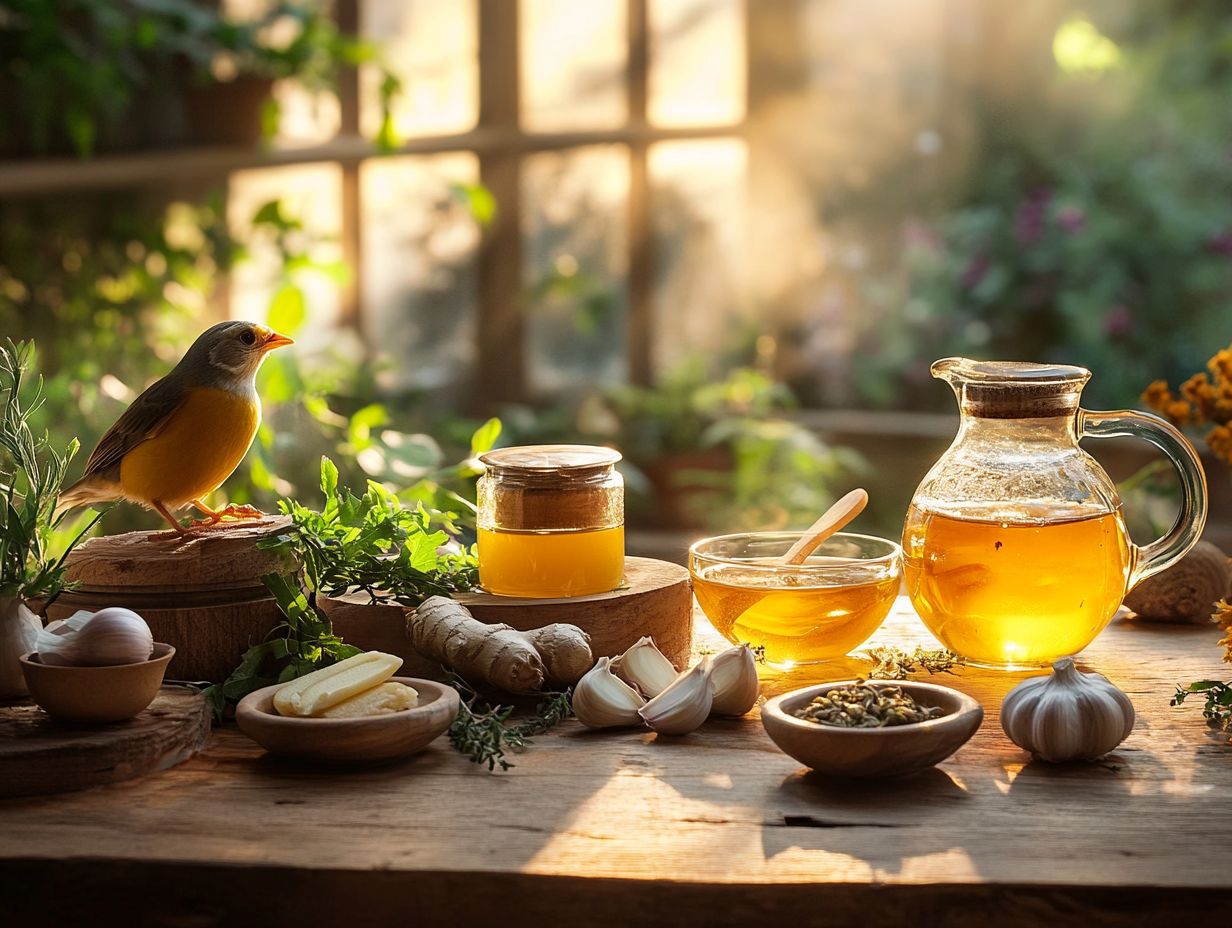
- Honey and Turmeric: A mixture can help treat respiratory issues in birds, such as coughing or sneezing.
- Garlic: Adding a small amount to your bird’s food can boost their immune system and help fight off infections.
- Chamomile: This herb can calm an upset stomach in birds, as well as reduce inflammation and pain.
- Apple Cider Vinegar: Diluted in water, it can help with digestion and boost overall health.
- Echinacea: This herb can help boost your bird’s immune system and combat bacterial and viral infections.
Can These Natural Remedies Be Used for Any Type of Bird?
Yes, these remedies can be used for various birds, including parrots, canaries, finches, and more. However, it is always best to consult with a veterinarian before trying any new remedies.
How Often Should These Natural Remedies Be Used?
The frequency of use will depend on the specific ailment and the individual bird. It is important to follow the recommended dosage and consult with a veterinarian if the symptoms persist.
Are There Any Natural Remedies That Can Help with Feather Plucking?
Apple cider vinegar can help reduce stress and anxiety in birds, which can sometimes lead to feather plucking. Additionally, chamomile can calm birds and reduce the urge to pluck feathers.
Can These Natural Remedies, Such as Herbal Options, Replace Traditional Medication?
While natural remedies can be effective for certain bird ailments, including respiratory infections and digestive issues, it is important to consult with a veterinarian before completely replacing traditional medication. In some cases, a combination of natural and traditional treatments, including herbal preparations, may be the most effective option for your bird’s health.
Are there any potential side effects of using these natural remedies, including herbal supplements?
As with any treatment, there’s always a risk of side effects. It’s crucial to watch for any unusual signs from your bird when using these natural remedies.
Some remedies may contain unique ingredients. If you notice anything unusual, consult a veterinarian or veterinary surgeon right away.

